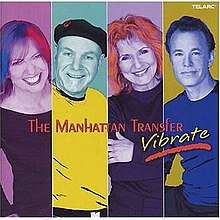Vibrate (The Manhattan Transfer album)
Vibrate is an album by The Manhattan Transfer. It was released on September 28, 2004 on Telarc International Corporation.[2]
| Vibrate | ||||
|---|---|---|---|---|
 | ||||
| Studio album by | ||||
| Released | September 28, 2004 | |||
| Genre | Jazz | |||
| Label | Telarc International Corporation | |||
| Producer | The Manhattan Transfer[1] | |||
| The Manhattan Transfer chronology | ||||
| ||||
The album is available in three formats: Super Audio CD, CD, and MP3 download.
Track listing[3]
- "Walkin' in N.Y." (Brenda Russell) (3:55)
- "Greek Song" (Rufus Wainwright) (4:43)
- "Vibrate" (Rufus Wainwright) (4:30)
- "The New JuJu Man (Tutu)" (Marcus Miller, Jon Hendricks) (5:43)
- "Doodlin'" (Horace Silver) (5:26)
- "The Twelfth" John Yano (4:13)
- "First Ascent" (Billy Hulting, Bob Mair, Alan Paul) (5:31)
- "Core of Sound" (Modinha) (Antônio Carlos Jobim, Vinicius de Moraes, Alan Paul) (4:58)
- "Feel Flows" (Jack Rieley, Carl Wilson) (5:09)
- "Embraceable You" (George Gershwin, Ira Gershwin) (4:11)
- "Come Softly to Me / I Met Him on a Sunday" (Gretchen Christopher, Barbara Ellis, Gary Troxel / Shirley Owens, Addie "Micki" Harris, Beverly Lee, Gary Troxel) (4:39)
References / Sources
- CD packaging
- CD packaging
- CD packaging
gollark: !time set 🌵
gollark: That's fine.
gollark: !time
gollark: !time set Europe/London
gollark: 11:57 here.
This article is issued from Wikipedia. The text is licensed under Creative Commons - Attribution - Sharealike. Additional terms may apply for the media files.